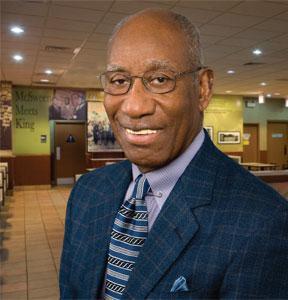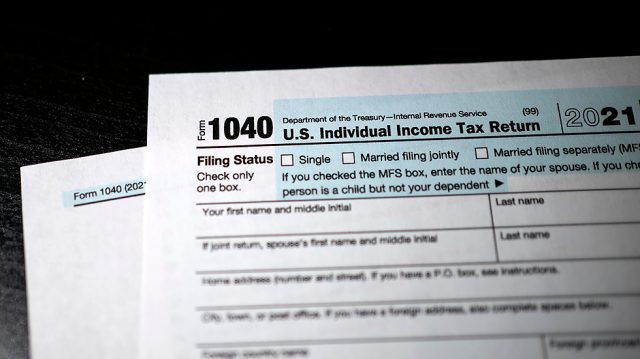With help from Rishika Dugyala, Zach Colman and Teresa Wiltz
Supreme Court nominee Judge Ketanji Brown Jackson arrives for her confirmation hearing in the Hart Senate Office Building on Tuesday. | Anna Moneymaker/Getty Images
What up, Recast family! President Joe Biden warns Americans that Russia may be launching cyber attacks against the U.S., fresh concerns about an Omicron subvariant emerge and longtime Rep. Jim Clyburn (D-S.C.) officially announces he’s seeking a 16th term. But we kick things off with the Supreme Court confirmation hearings of Judge Ketanji Brown Jackson.
Supreme Court confirmation hearings are always a combative — and highly partisan — affair. It’s a time-honored tradition dating back to the days of Republican President Ronald Reagan’s failed nomination of conservative legal theorist Robert Bork in 1987. (Some argue the tradition dates back even further.)
With the confirmation hearings of Judge Ketanji Brown Jackson,Republicans on the Senate Judiciary Committee are promising a respectful but thorough cross-examination of the judicial record and philosophy of President Biden’s pick for the next Supreme Court justice.
They started out by praising her accomplishments and nodding to the historic nature of her nomination — Jackson, after all, would be the first Black woman to serve on the high court. But they also seem poised to make this confirmation process about two things: raising grievances for past confirmation battles and playing up culture war issues ahead of the 2022 midterms.
Some four hours into Day 1 of the hearings, after all 22 of the lawmakers on the committee delivered remarks about what they each wanted to see from a justice, Jackson’s voice was finally heard.
She invoked her mom and dad: “My parents were public school teachers, and to express both pride in their heritage and hope for the future, they gave me an African name: Ketanji Onyika, which they were told means ‘lovely one,’” she told the committee, another nod that history is being made.
Jackson, who currently sits on the U.S. Court of Appeals for the District of Columbia, also talked about her judicial philosophy.
“I decide cases from a neutral posture, I evaluate the facts. And I interpret and apply the law to the facts of the case before me, without fear or favor, consistent with my judicial oath,” Jackson said in prepared remarks.
Nonetheless, lingering beefs over past confirmation hearings — not to mention race — seemed never far from the surface during this process.
WATCH: Graham claims Judge KBJ is the ‘beneficiary of a lot’
“Bottom line here … it is about philosophy when it’s somebody of color on our side,” Sen. Lindsey Graham (R-S.C.) said Monday. “It’s about we’re all racists if we ask hard questions,” he added in an attempt to get out in front of criticism that Republicans’ pointed questioning of Jackson could be construed as prejudiced.
Later, Graham told Jackson: “You’re the beneficiary of a lot. You’re the beneficiary of Republicans nominees having their lives turned upside down, and it didn’t work.”
“You don’t have to be Black to hear the dog whistle,” wrote Joan Vennochi, a Boston Globe columnist who is white.
As my POLITICO colleagues Josh Gerstein and Marianne LeVine point out, Graham and others rehashed the contentious confirmation hearings of Supreme Court Justice Brett Kavanaugh in 2018.
Even while Republicans vowed not to attack Jackson personally, some leaned into
lecturing, seemingly calling into question her nearly decade-long career as a judge.
WATCH: Blackburn to Ketanji Brown Jackson: ‘What’s your hidden agenda?’
Some, like Sen. Marsha Blackburn of Tennessee previewed their lines of questioning in the coming days.
“I can only wonder what’s your hidden agenda? Is it to let violent criminals, cop killers and child predators back to the streets? Is it to restrict parental rights and expand government’s reach into our schools and our private family decisions?” Blackburn quizzed Jackson, though in this period of the hearing, the judge was unable to respond.
Blackburn continued: “You have made clear judges must consider critical race theory when deciding how to sentence criminal defendants. Is it your personal hidden agenda to incorporate critical race theory into our legal system? These are answers that the American people need to know.” (Jackson has not called for mandating the use of critical race theory in federal sentencing.)
The issue of critical race theory, a decades-old legal doctrine that argues race and racism are embedded in the fundamental elements of American government and institutions, has become a wedge issue as many conservative states have passed or are considering legislation to ban its teaching in K-12 schools. (Most school districts say they do not teach the theory.)
The uptick in crime is also an area of focus for many midterm contests, and that line of questioning is apparently aimed at showing Jackson will be soft on crime.
Mask mandates, white privilege and school choice were also brought up as topics of discussion some GOP members may ask Jackson to weigh in on.
“In some ways, the hearings are so politicized, that they’re not really about a particular candidate,” said Tomiko Brown-Nagin, a law professor and dean of Harvard Radcliffe Radcliffe Institute of Advanced Study at Harvard University. “So it’s clear that some senators are talking to the American people in anticipation of the upcoming elections, whether it’s the congressional elections, midterms or presidential elections.”
It’s not as if Democrats haven’t taken advantage of the spotlight that a Supreme Court nomination hearing brings to the Judiciary Committee.
Sen. Cory Booker (D-NJ) had his so-called “Spartacus Moment” during the Kavanaugh hearings. This time he seemed more reflective of the history at play.
“This is not a normal day for America,” Booker said on Monday. “We have never had this moment before.”
Let’s not forget how then-Sen. Kamala Harris (D-Calif.) raised her national profile during the Kavanaugh hearings. She rode that wave to become the Vice President — and may have to break a 50-50 tie to confirm Jackson should no Republicans cross the aisle to vote for her.
WATCH: Sen. Josh Hawley lists his issues with Ketanji Brown Jackson’s record: ‘Not interested in trying to play gotcha’
In the coming days though, look for tough questioning from those like Sen. Josh Hawley (R-Mo.), who like Harris and Booker four years ago, is thought to have his eyes trained on a White House run in 2024.
He’s promised to focus his time hammering Jackson’s record on what he suggested are lenient sentences of defendants convicted of offenses stemming from child pornography.
All of which is fair game. But for these senators, these moments are also about elevating their profiles, boosting campaign funds and igniting votes ahead of future campaign announcements.
It also is a convenient way to exact some payback for previous confirmation fights, even if those fisticuffs didn’t prevent any of the nominees from being confirmed.
All the best,
The Recast Team
Power dynamics are changing.With The Recast, you’ll get a twice-weekly breakdown of how race and identity are the DNA of American politics and policy.
Was this forwarded to you by a friend? Subscribe to the newsletter here.
THE EXCLUSIVE
President Joe Biden delivers remarks about project labor agreements in February. | Chip Somodevilla/Getty Images
In the early days of his administration, President Biden signed an executive order establishing the Justice40 Initiative. It’s a program where at least 40 percent of the benefits of government investments in climate and infrastructure will be funneled
to neighborhoods most in need, including communities of color.
But, fearing legal challenges, the White House dropped race as a determining factor in allocating resources when it unveiled its tool to help administer the program. The Biden administration is banking on The Bipartisan Infrastructure Law to be the vehicle driving his climate and environmental initiatives home … except for one problem, as POLITICO’s Zack Colman explains:
President Joe Biden sold last year’s $550 billion plan for new infrastructure spending by promising it will spur transformative climate and equity programs nationwide. The problem: States control most of the cash and may not share his goals of tackling climate change or reversing the effects of institutionalized racism.
With Democrats’ sweeping social and climate spending bill dead in the water, it’s looking increasingly like that bipartisan package that invests hundreds of billions in repairing roads, bridges and water systems will represent Biden’s signature domestic achievement going into the midterms. But the lack of federal control over how these dollars are spent is raising doubts about whether Biden can meet his pledges, disappointing his supporters.
The U.S. Capitol dome is seen from the East Front in August 2021. | Sarah Silbiger/Getty Images
“People are saying ‘Where are the projects?’” Robert Bullard, a Texas Southern University professor and member of Biden’s White House Environmental Justice Advisory Committee, said of frustration in communities of color. “They know the pressure they’re going to be under with the midterms. There has to be something tangible rolled out because these people stood for hours in line [to vote] during the pandemic and they’re going to be asked to do it again in November — and if nothing happens they’re going to ask, ‘Why?’”
Biden’s inability to control how a large portion of the infrastructure money gets spent is largely due to legal constraints. About 75 percent of the funds approved in the infrastructure law will be distributed to states via a complicated formula set by existing statutes, including the bulk of federal highway dollars.
Communities that have for decades been on the short end of federal funding worry that these constraints will leave them in the same position, missing out on historic cash infusions.
“Environmental justice communities have faced more [hardship] than many people have faced in this society, in this country. We have paid with our lives, with our blood, with our labor in addition to the taxes and whatever else we bring to the table,” said Donele Wilkins, CEO of Green Door Initiative, a Detroit-based environmental justice group. “We just want to get a return on our investment wherever we can get it.”
Water infrastructure spending also highlights the dynamic. The law injects $50 billion into drinking water and wastewater infrastructure, lead pipe removal and cleaning up toxic contaminants, but most funding flows through state-run revolving loan funds. Yet just 10 percent — $5 billion — will go to “small and disadvantaged communities.” That’s despite the White House and Democrats calling attention to low-income residents struggling to afford their water bills and lead poisoning disproportionately plaguing communities of color.
THE TIME CAPSULE
Champion Cassius Clay (Muhammad Ali) raises his hands over his head after knocking challenger Zora Folley down in fourth round of their heavyweight title fight in New York’s Madison Square Garden March 22, 1967. Referee John Lo Bianco moves toward Clay who won on a seventh round knockout. (AP Photo). | AP Photo
On this day 55 years ago, Muhammad Ali successfully defended his championship
belt against challenger Zora Folley.
There was nothing remarkable about the bout itself that night at Madison Square Garden on March 22, 1967. Folley lasted until the seventh round before Ali delivered a crushing straight right cross to knock him out.
It would however be the last time Ali — then known as Cassius Clay — would set foot inside a ring before he was arrested, stripped of his boxing license and had his heavyweight title revoked for refusing to be inducted into the U.S. Army during the Vietnam War.
Ali, a Muslim, cited his religion when he talked about why he was a conscientious objector to the war.
“The Greatest of All Time”’ would famously say this about not wanting to go to war: “I ain’t got no quarrel with them Viet Cong,” before delivering this stinging line that helped cement his status as an icon of the civil rights movement.
“No Viet Cong ever called me nigger.”
Zora Folley, left, moves in on champion Cassius Clay (Muhammad Ali) in first round of their heavyweight title fight in New York’s Madison Square Garden, March 22, 1967. (AP Photo) | AP Photo
Roughly three months after the Folley fight, Ali was convicted of draft evasion, a felony, which carried a 10,000 fine. He didn’t serve any of the five-year prison term for the charge, but appealed the conviction, which made it all the way to the Supreme Court.
The Supreme Court overturned the conviction, but that unanimous 8-0 decision wasn’t handed down until June 1971.
In that case, Justice Thurgood Marshall recused himself from the case because he had been the DOJ solicitor general when the Justice Department pursued charges against Ali.
ICYMI @ POLITICO
Rep. Pete Aguilar speaks during a news conference at the U.S. Capitol in Washington, D.C. | Alex Wong/Getty Images
The Big Bet — Rep. Pete Aguilar (D-Calif.) looks to be playing the long game. As more than 30 of his House Democratic colleagues are calling it quits with the party bracing for sizable midterm losses, he wants to stick around. POLITICO’s Nicholas Wu adds, the move could pay off with Aguilar moving up the leadership ranks.
Biden’s Student Loan Conundrum — President Biden’s indecision on student loan debt is imperiling enthusiasm among a key voting bloc: young voters, reportPOLITICO’s Christopher Cadelago and Laura Barrón-López.
Keep Calm and… — Several European nations are experiencing upticks in Covid-19 cases, suspected to be linked to an Omicron subvariant. U.S. Surgeon General Vivek Murthy says we should prepare, not panic, reports POLITICO’s David Cohen.
THE RECAST RECOMMENDS
“Starstruck,” the HBO romantic comedy starring creator Rose Matafeo and Nikesh Patel, is back.
The National Book Critics Circle announces its 2021 winners. Among them: The late Anthony Veasna So, who died of a drug overdose at 28 in 2020, won for best debut book. Other winners: Jeremy Atherton Lin, for his memoir, “Gay Bar: Why We Went Out”; Honorée Fanonne Jeffers’ novel, “The Love Songs of W.E.B. Du Bois”; and Clint Smith’s “How the Word Is Passed,” which explores the distorted legacy of slavery in the U.S.
A Tribe Called Quest’s Malik Izaak Taylor, akaAKA/Phife Dawg/The Five Foot Freak, who referred to himself as “a funky diabetic,” died from complications of diabetes in 2016. But now you can check out his posthumous solo album, “Forever,” executive-produced by Dion Liverpool, his long-time collaborator and manager.
Say it ain’t so: Daddy Yankee is retiring from music—– but he’s not before gracing us with one last album, “Legendaddy,” (dropping on Thursday) and one last tour, “La Última Vuelta World Tour,” beginning in August. So we’re leaving you with a little reminder of the hit that propelled him to stardom back in ‘2004, “Gasolina.”
TikTok of the Day: Speaking of gasolina…















